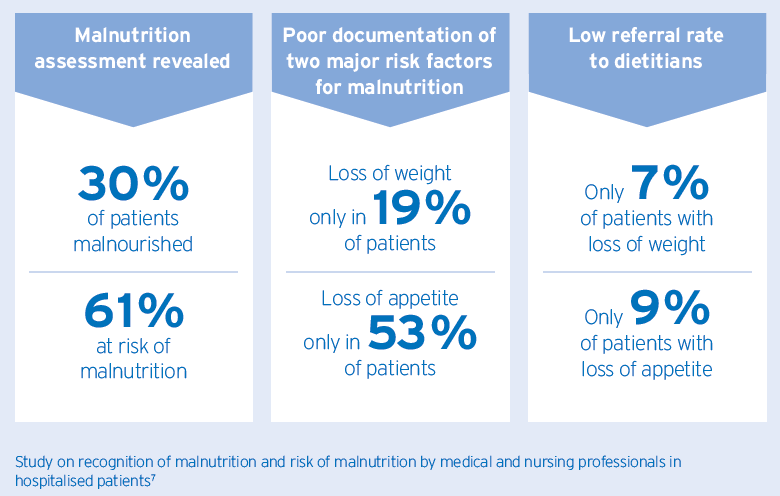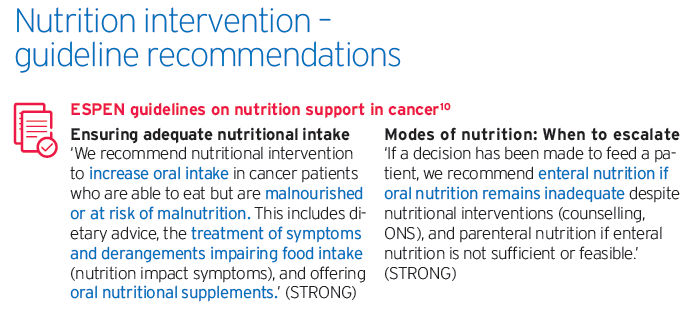Cancer-related anorexia - a highly prevalent side effect
Appetite disorders often come with cancer and anorexia is one symptom of the cancer cachexia syndrome.1,2
At the time of diagnosis, a prevalence up to 50–66 % is reported.3 In advanced cancer patients with different primary cancer sites the incidence of anorexia was 66 %.4

Causes of cancer anorexia are multifactorial1,5,6
- Anti-tumour treatments such as chemotherapy or radiotherapy
- Inflammatory response caused by the tumour
- Distress and reduced desire to eat due to cancer diagnosis
have a negative effect on appetite.
Anorexia is significantly associated with weight loss
- Results in reduced caloric intake1,2,7
- Anorexia is significantly associated with weight loss ≥ 10 % (OR 13.4, p < 0.001)8
Anorexia negatively affects patients’ outcome1,2
- Negative impacts on patients’ perceptions and quality of life
- May lead to increased morbidity and mortality
Counteract anorexia and weight loss

Nutrition intervention is effective
Dietary intervention with high-energy ONS containing high protein levels and omega-3 PUFA during chemotherapy led to:
- Decrease in side effects10, like
- Loss of appetite
- Fatigue
- Neuropathy
- Increased energy and protein intake10
- Improvement in body weight and skeletal muscle mass/lean body mass11-13
- Positive modulation of inflammation markers10,12
- Improvement in Quality of Life and functional status14
Supportive care for better treatment outcome
You’d like to know more about
- the relationship between the nutritional status and anorexia
- multimodal treatment of cancer-related anorexia?
Please download:
Anorexia HCP-Folder.pdf
- Filename
- Anorexia HCP-Folder.pdf
- Size
- 2 MB
- Format
References:
1) Laviano A et al. Cancer anorexia: clinical implications, pathogenesis, and therapeutic strategies. Lancet Oncol. 2003;4(11):686-94.
2) Molfino A et al. Contribution of anorexia to tissue wasting in cachexia. Curr Opin Support Palliat Care. 2010;4(4):249-53.
3) Lis CG et al. Can anorexia predict patient satisfaction with quality of life in advanced cancer? Support Care Cancer. 2009;17(2):129-35.
4) Walsh D et al. The symptoms of advanced cancer: relationship to age, gender, and performance status in 1,000 patients. Support Care Cancer. 2000;8(3):175-9.
5) Ezeoke CC, Morley JE. Pathophysiology of anorexia in the cancer cachexia syndrome. J Cachexia Sarcopenia Muscle. 2015;6(4):287-302.
6) Barajas Galindo DE et al. Appetite disorders in cancer patients: Impact on nutritional status and quality of life. Appetite. 2017;114:23-7.
7) Arends J et al. ESPEN guidelines on nutrition in cancer patients. Clin Nutr. 2017;36(1):11-48.
8) Sánchez-Lara K et al. Gastrointestinal symptoms and weight loss in cancer patients receiving chemotherapy. Br J Nutr. 2013;109(5):894-7.
9) Solheim TS et al. Weight loss, appetite loss and food intake in cancer patients with cancer cachexia: three peas in a pod? - analysis from a
multicenter cross sectional study. Acta Oncol. 2014;53(4):539-46.
10) Sánchez-Lara K et al. Effects of an oral nutritional supplement containing eicosapentaenoic acid on nutritional and clinical outcomes in patients with advanced non-small cell lung cancer: randomised trial. Clin Nutr. 2014;33(6):1017-23.
11) de van der Schueren MAE et al. Systematic review and meta-analysis of the evidence for oral nutritional intervention on nutritional and clinical outcomes during chemo(radio)therapy: current evidence and guidance for design of future trials. Ann Oncol. 2018;29(5):1141-53.
12) Shirai Y et al. Fish oil-enriched nutrition combined with systemic chemotherapy for gastrointestinal cancer patients with cancer cachexia. Sci Rep. 2017;7(1):4826.
13) van der Meij BS et al. Oral nutritional supplements containing (omega-3) polyunsaturated fatty acids affect the nutritional status of patients with stage III non-small cell lung cancer during multimodality treatment. J Nutr. 2010;140(10):1774-80.
14) van der Meij BS et al. Oral nutritional supplements containing omega-3 polyunsaturated fatty acids affect quality of life and functional status in lung cancer patients during multimodality treatment: an RCT. Eur J Clin Nutr. 2012;66(3):399-404.




